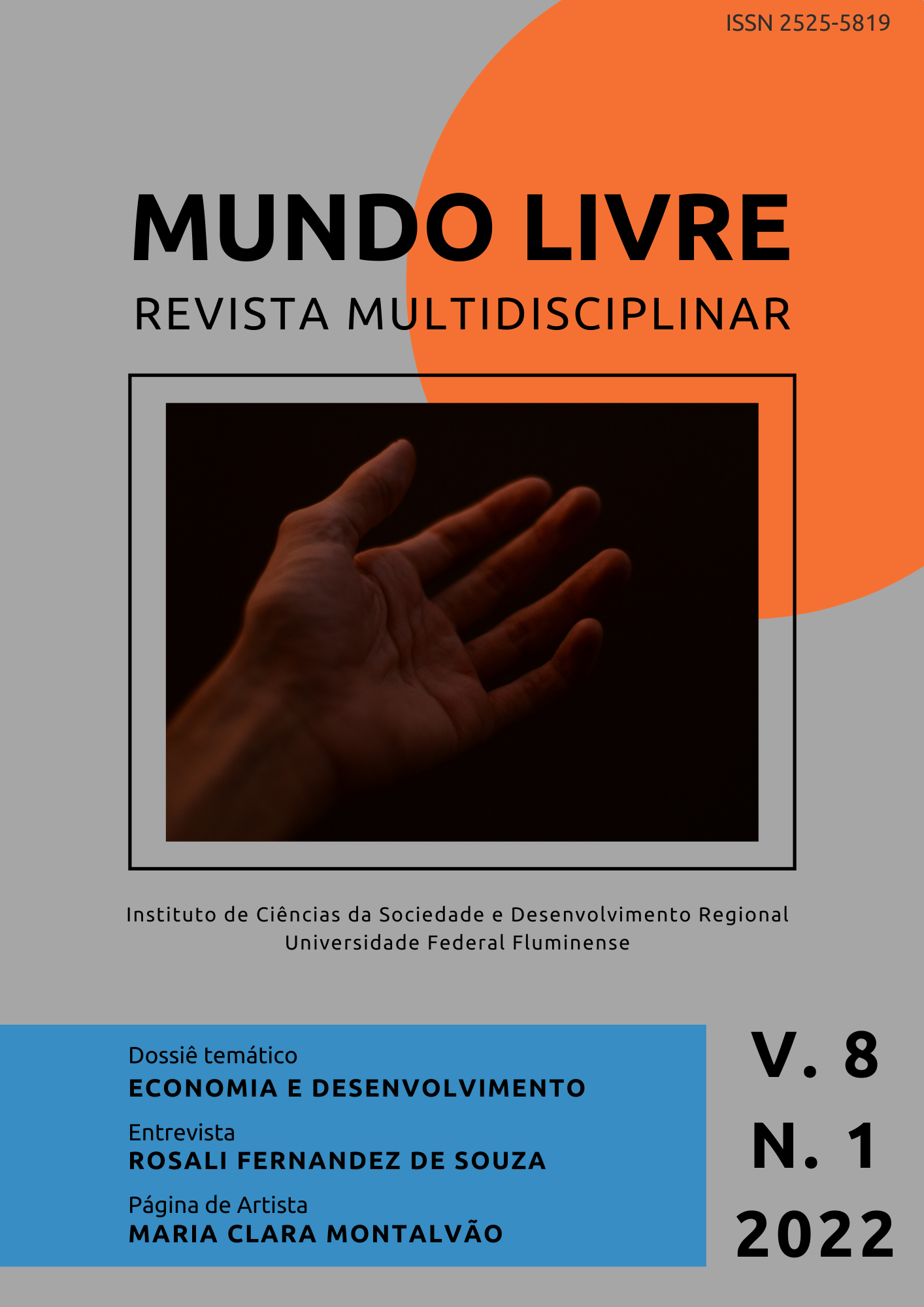Effects of fiscal policies on Brazilian economic growth
an analysis in system dynamics applied to the Solow-Swan model
Keywords:
Economic Growth, Solow-Swan model, Systems DynamicsAbstract
The objective of this article is to understand the effects of fiscal policy decisions, on the growth of the Brazilian economy, between the years 2000 and 2010. For that, the Solow-Swan growth model was used in the language of Systems Dynamics, which allows to understand and measure the impacts of the actions of economic agents on the growth of a nation-state. The preparation of this article was organized in five sections: the first section that makes an introductory allusion to the theme setting out the objective of this article and the hypothesis tested, the second section elaborates a theoretical framework based on studies published in journals, the third section comprises the elaboration of the model in systems dynamics, the fourth section comprises the results and the fifth deals with the final considerations of the study. Through this research it can be considered that the results presented by the tool were consistent compared to the real data, as well as it can also be revealed that fiscal policy decisions directly interfered in long-term economic growth, reducing the average rate of economic growth in the case of deficit policies, and expanding when it came to surplus fiscal policies.
Downloads
References
ABRAMOVITZ, M. Catching Up, Forging Ahead, and Falling Behind. The Journal of Economic History, v.46. n.2, 1986.
BANCO CENTRAL DO BRASIL. Séries Temporais Balança de Pagamentos. [s. d.]. Disponível em: https://www3.bcb.gov.br/sgspub/. Acesso em: 20 abr. 2020.
BONELLI, R. O desenvolvimento econômico brasileiro em uma visão de longo prazo. In: PEREIRA, L. V.; VELOSO, F.; BINGWEN, Z. (Orgs.) Armadilha da renda média: visões do Brasil e da China. Rio de Janeiro: FGV, IBRE, 2013. v. 1.
BRASIL. Ministério da Economia. Séries Temporais Balança Comercial Brasileira. Disponível em: http://www.mdic.gov.br/index.php/comercio-exterior/
estatisticas-de-comercio-exterior/balanca-comercial-brasileira-acumulado-do-ano. Acesso em: 20 abr. 2020.
BRASIL. Tesouro Nacional. Séries Temporais do Tesouro Nacional. Disponível em: https://www.tesourotransparente.gov.br/visualizacao/series-temporais-do-tesouro-nacional. Acesso em: 18 abr. 2020.
BUENO, N. P. O modelo de Solow-Swan na linguagem de dinâmica de sistemas: uma aplicação para o Brasil. Nova Economia, v. 20, n. 2, 2010.
FREITAS, M. V. de; ALMEIDA, E. Existe realmente convergência de renda entre países?. Estudos Econômicos, v.45, n.2, p. 287-316, 2015. Disponível em: https://www.revistas.usp.br/ee/article/view/38341. Acesso em: 21 set. 2019.
HEIJDRA, B. J.; PLOEG FREDERICK VAN DER. The Foundations of Modern Macroeconomics. 1. ed. Oxford: Oxford University, 2002.
IBGE. IPCA - índice geral e grupos de produtos e serviços. Disponível em: https://seriesestatisticas.ibge.gov.br/. Acesso em: 18 abr. 2020.
IBGE. Projeção da população do Brasil. [S. d.]. Disponível em: https://seriesestatisticas.ibge.gov.br/. Acesso em: 18 abr. 2020.
IBGE. Pessoas de 15 anos ou mais de idade economicamente ativas. Disponível em: https://seriesestatisticas.ibge.gov.br/. Acesso em: 18 abr. 2020.
JONES, C. I. Introdução à teoria do crescimento econômico. São Paulo: Campus, 2000.
MUELLER, A. O Brasil na armadilha da renda média. Instituto Ludwig von Mises Brasil, 28 jan. 2016. Disponível em: https://www.mises.org.br/ArticlePrint.aspx?id
=1765. Acesso em: 22 mai. 2019.
ORGANIZAÇÃO PARA A COOPERAÇÃO E DESENVOLVIMENTO ECONÓMICO. Relatórios Econômicos OCDE: Brasil Fevereiro de 2018. 2018. Disponível em: www.oecd.org/eco/surveys/economic-survey-brazil.htm. Acesso em: 20 jun. 2019.
SOLOW, R. M.. A Contribution to the Theory of Economic Growth. The Quarterly Journal of Economics, v. 70, n.1, 1956.
SONAGLIO; C. M.; MISSIO, F. J.; PEREIRA, H. C. I. A armadilha da renda média: trajetória brasileira e apreciações críticas. Revista Debate Econômico, v. 4, n. 2, p. 6-34, jul./dez. 2016.
SWAN, T. W.. Economic Growth and Capital Accumulation; the Economic Record, The Economic Society of Australia, v.32, n.2, 1956.
VILLELA, P. R. C.. Introdução à Dinâmica De Sistemas. Juiz de Fora: UFJF, 2005. Disponível em: http://www.ufjf.br/ciro_barbosa/files/2011/02/ds_parte1.pdf. Acesso em: 20 jun. 2019.
Downloads
Published
How to Cite
Issue
Section
License
Copyright (c) 2022 Luiz Felipe Marvila de Vasconcellos, Alan Figueiredo Aredes

This work is licensed under a Creative Commons Attribution 4.0 International License.
Autores que publicam nesta revista concordam com os seguintes termos:
1.Autores mantém os direitos autorais e concedem à revista o direito de primeira publicação, com o trabalho simultaneamente licenciado sob a Licença Creative Commons Attribution que permite o compartilhamento do trabalho com reconhecimento da autoria e publicação inicial nesta revista.
2.Autores têm autorização para assumir contratos adicionais separadamente, para distribuição não-exclusiva da versão do trabalho publicada nesta revista (ex.: publicar em repositório institucional ou como capítulo de livro), com reconhecimento de autoria e publicação inicial nesta revista.
3.Autores têm permissão e são estimulados a publicar e distribuir seu trabalho online (ex.: em repositórios institucionais ou na sua página pessoal) a qualquer ponto antes ou durante o processo editorial, já que isso pode gerar alterações produtivas, bem como aumentar o impacto e a citação do trabalho publicado.





